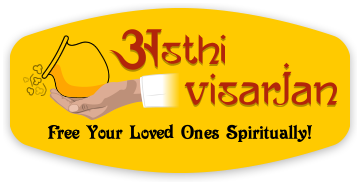
ASTHI
VISARJAN +
VISARJAN +
PIND
DAAN +
DAAN +
OTHERS +
GALLERY +
For non-resident Indians or NRIs who are less informed on the Vedic rituals for the deceasedand wish to learn more about the concepts and terms that are central to the Asthi Visarjan sacred ceremony, here is an essential glossary of terms that you are most likely to encounter when availing of the services for the Asthi Visarjan Hindu ritual.

Asthi Glossary

The sacred ritual that involves the immersion of a deceased person’s ashen remains and bones along the sacred banks of the holy Ganges River, as prescribed in holy Vedic literature.
Also known as Pitr Paksha is a ritualistic homage to ancestors marked with food offerings and other ceremonies. This is mandatory because of the Hindu belief that the living family will face consequences should the ritual not be performed.
Also known as Svarga, this is heaven in Hindu belief. It is the paradise where the righteous souls rest between incarnations.
The Sanskrit word for immersion of cremated ashes and bones in the flowing waters of a river.
The deceased person’s bone and ashen remains that are gathered in a clean white cloth after the process of cremation.
A person’s soul that leaves the physical and material body after death to start its journey toward final emancipation.
The spiritual capital of India is a city in Uttar Pradesh in northern India, located on the banks of the Ganges River. According to Hindu belief, the soul achieves salvation if the final homage to the deceased is performed in this place.
A Sanskrit word that means wise and learned religious mentor or teacher.
These banks of the Ganges River are the sacred and prescribed site for the ritual of Asthi Visarjan.
A donation of a cow offered to a Brahmin which is believed to prevent the departed’s soul from falling into the Vaitarani River, thereby hampering it from reaching Swarga or heaven and attaining Moksha.
Food offered to Brahmins on a Shraddha day that is believed to transcend to the heavens. According to Hindu belief, the food offered to Brahmins will please the gods and souls of ancestors that reside in the Brahmins themselves.
Hindu priests who are highly-trained and completely knowledgeable in the texts of the Vedas and other Hindu religious epics. They are the ones who can perform the Hindu religious rituals.
The priest born into the Brahmin caste who has attained the highest knowledge in Hindu religion, having been learned on the four ancient Vedic scriptures. All Brahmin may be categorized as pandits. However, not all pandits may be regarded as Brahmin.
In Hindu religious belief, this ceremony or ritual should be conducted for 10 days after a person dies, as prescribed by this Hinduism holy book.
Also called mukti, vimukti, or vimoksha, literally means final emancipation, freedom, release, or liberation from Samsara or the cycle of death and rebirth.
An act of faith manifested through rituals conducted for the benefit of ancestors’ souls.
Hinduism’s most sacred river, representing all the sacred waters. The Vedic rituals after death require the immersion of the deceased ashes in its holy waters for their redemptive qualities.
A very significant and obligatory Vedic last rituals for the dearly departed aimed to free the soul with ease and less pain from the person’s physical being after death.
The karmic debt of ancestors which the living family is obliged to pay so they can be free of this debt. The ancestors will eventually bless them with good fortune and happiness.
Ritual or spiritual event in Hinduism performed with worship to the gods and prayer in commemoration of a deceased person.
In Sanskrit, the process of refinement and purification of conscience where a person becomes an outstanding individual through the elimination of negative thinking and action.
Hinduism’s oldest sacred texts. These holy scriptures are in Vedic Sanskrit.